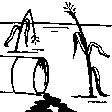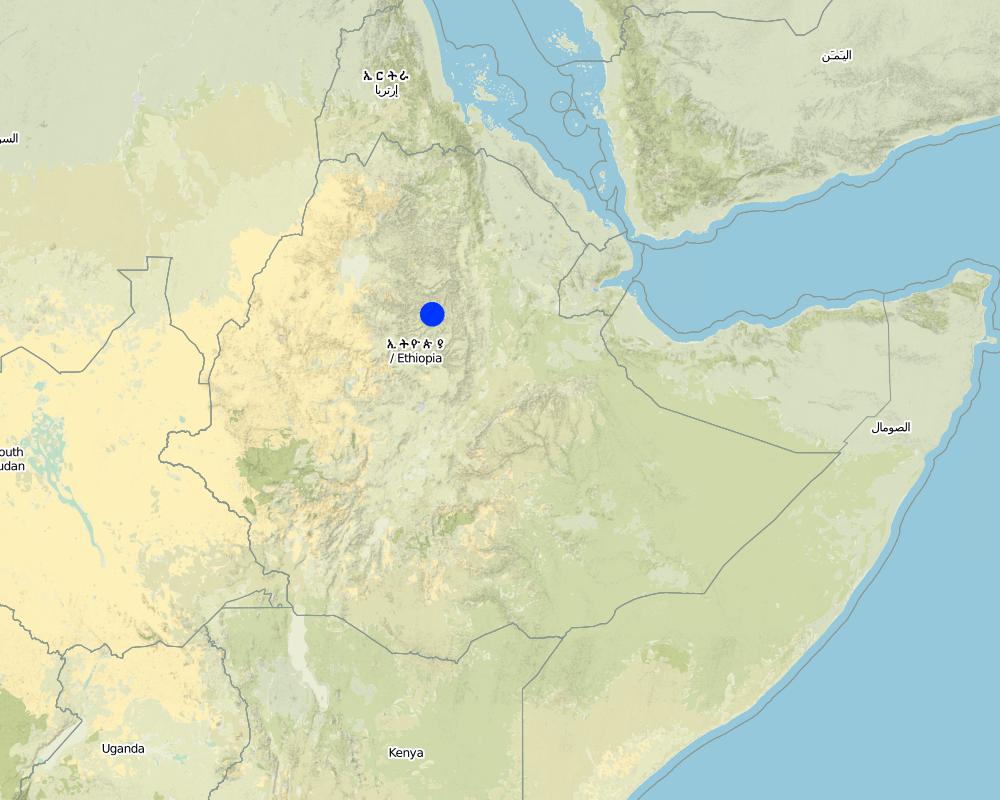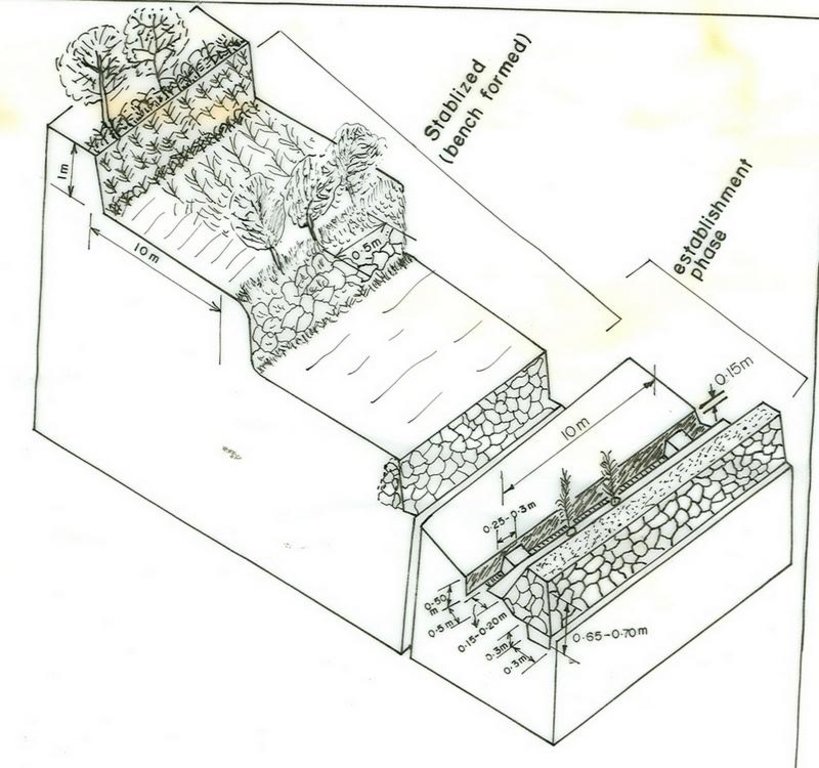Stablized Stone Faced Soil Bund [埃塞俄比亚]
- 创建:
- 更新:
- 编制者: Unknown User
- 编辑者: –
- 审查者: Fabian Ottiger, Alexandra Gavilano
Kirit (Amharic)
technologies_1063 - 埃塞俄比亚
查看章节
全部展开 全部收起1. 一般信息
1.2 参与该技术评估和文件编制的资源人员和机构的联系方式
关键资源人
SLM专业人员:
Abegaz Ayalew Yimer
Ambassel Woreda Agriculture and Rural Development Office
埃塞俄比亚
有助于对技术进行记录/评估的机构名称(如相关)
Ministry of Agriculture and Rural Development of Ethiopia (Ministry of Agriculture and Rural Development) - 埃塞俄比亚1.3 关于使用通过WOCAT记录的数据的条件
编制者和关键资源人员接受有关使用通过WOCAT记录数据的条件。:
是
1.5 参考关于SLM方法(使用WOCAT记录的SLM方法)的调查问卷

Local Level participatory planning approach (LLPPA) [埃塞俄比亚]
Participatory planning tools using various PRA techniques to enable the local community to identif their problem prioritize to sellect suitable measures & activities (planing, implementing & mgt of conservation based initiatives.
- 编制者: Philippe Zahner
2. SLM技术的说明
2.1 技术简介
技术定义:
Stablized bund constructed fron stone and soils on the farm land along the contour and planted with multipurposive plant species
2.2 技术的详细说明
说明:
The stablized bund is constructed on farm land in order to reduce slope length, angle and there by control soil erosion and enhance moisture/water retention capacity of siols. The bund is established along the contour by digging trench/foundation and place stone walls on the excavated trench. It is stablized by planting grass. The structure is regularly maintained by repairing breaks. Some farmers put on additional height to the bunds as part of the upgrading practice. The technology is suitable to all agroecological conditions, where stones are available for construction.
2.5 已应用该技术的、本评估所涵盖的国家/地区/地点
国家:
埃塞俄比亚
区域/州/省:
Amhara
有关地点的进一步说明:
Ambassel
具体说明该技术的分布:
- 均匀地分布在一个区域
如果不知道精确的区域,请注明大致覆盖的区域:
- 10-100 平方千米
注释:
Since the implementation of this technology flooding problem has reduced with additional benefit of protecting roads. Communies benefited from ffw payments and activities, production of farm land improved (both crop & fodder)
Map
×2.6 实施日期
如果不知道确切的年份,请说明大概的日期:
- 50多年前(传统)
2.7 技术介绍
详细说明该技术是如何引入的:
- 通过项目/外部干预
注释(项目类型等):
It is locally known but with improved techniques. Stone walls are used in the area for making barriers for runoff.
3. SLM技术的分类
3.1 该技术的主要目的
- 减少、预防、恢复土地退化
3.2 应用该技术的当前土地利用类型
同一土地单元内混合使用的土地::
是
具体说明混合土地使用(作物/放牧/树木):
- 农林业

农田
- 一年一作
- 乔木与灌木的种植
年作 - 具体指明作物:
- 谷类 - 大麦
- 谷物类 - 玉米
- 谷类 - 高粱
- 豆科牧草和豆类 - 豆子
- 豆科牧草和豆类 - 豌豆
- wheat, teff
乔木和灌木种植 - 指定作物:
- 饲料树木(朱缨花属、银合欢、前庭草等)
每年的生长季节数:
- 2
具体说明:
Longest growing period in days: 24 0Longest growing period from month to month: May - Dec Second longest growing period in days: 150 Second longest growing period from month to month: Feb - Jun
注释:
Major food crop annual cropping: Sorghum, maize, teff, wheat, barley, beans, peas
Trees/ shrubs species: pigeon pea, sesbania sesban, treelucern (Fabaceae)
Major land use problems (compiler’s opinion): Soil erosion, overgrazing, deforestation, encrochment of one type of landuse over the other (competetion between landuse types)
Major land use problems (land users’ perception): declining production, shallow soil depth, infestation of weeds (exotic)
Type of cropping system and major crops comments: Sorghum-teff, maize-beans, teff-check peas, wheat/barley-legumes
3.4 供水
该技术所应用土地的供水:
- 雨养
注释:
Water supply: Also mixed rainfed - irrigated
3.5 该技术所属的SLM组
- 横坡措施
3.6 包含该技术的可持续土地管理措施
3.7 该技术强调的主要土地退化类型

土壤水蚀
- Wt:表土流失/地表侵蚀
- Wg:冲沟侵蚀/沟蚀
- Wm:块体运动/滑坡

化学性土壤退化
- Cn:肥力下降和有机质含量下降(非侵蚀所致)
注释:
Main type of degradation addressed: Wt: loss of topsoil / surface erosion
Secondary types of degradation addressed: Wg: gully erosion / gullying, Wm: mass movements / landslides, Cn: fertility decline and reduced organic matter content
3.8 防止、减少或恢复土地退化
具体数量名该技术与土地退化有关的目标:
- 减少土地退化
注释:
Secondary goals: prevention of land degradation, rehabilitation / reclamation of denuded land
4. 技术规范、实施活动、投入和成本
4.1 该技术的技术图纸
技术规范(与技术图纸相关):
Amhara
Technical knowledge required for field staff / advisors: moderate
Technical knowledge required for land users: moderate
Main technical functions: reduction of slope angle, reduction of slope length
Secondary technical functions: control of dispersed runoff: retain / trap, control of dispersed runoff: impede / retard, increase of infiltration, increase / maintain water stored in soil, water harvesting / increase water supply
Aligned: -contour
Vertical interval between rows / strips / blocks (m): 1m
Spacing between rows / strips / blocks (m): 10m
Vertical interval within rows / strips / blocks (m): 0.25-0.5m
Trees/ shrubs species: pigeon pea, sesbania sesban, treelucern
Bund/ bank: level
Vertical interval between structures (m): 1m
Spacing between structures (m): 10m
Depth of ditches/pits/dams (m): 0.5m
Width of ditches/pits/dams (m): 0.5m
Length of ditches/pits/dams (m): 166m
Height of bunds/banks/others (m): 0.7m
Width of bunds/banks/others (m): 0.5-1.20m
Length of bunds/banks/others (m): 170m
Construction material (earth): dig earth and form an embankment
Construction material (stone): place stone wall at downslope side to support earth embankment
Slope (which determines the spacing indicated above): 12%
If the original slope has changed as a result of the Technology, the slope today is: 0%
Lateral gradient along the structure: 0%
Vegetation is used for stabilisation of structures.
4.2 有关投入和成本计算的一般信息
其它/国家货币(具体说明):
Birr
如相关,注明美元与当地货币的汇率(例如1美元=79.9巴西雷亚尔):1美元=:
8.6
注明雇用劳工的每日平均工资成本:
0.70
4.3 技术建立活动
| 活动 | 时间(季度) | |
|---|---|---|
| 1. | contour tillage | uly/during crop sowing |
| 2. | contour planting | July/during crop sowing |
| 3. | collection of stones | dry season/off-season |
| 4. | layout and design | dry season/off-season |
| 5. | excavation of foundation & trenches | dry season/off-season |
| 6. | forming of embankment | dry season/off-season |
| 7. | compaction | dry season/off-season |
| 8. | sow/plant tree/grass species | onset of rain |
4.4 技术建立所需要的费用和投入
| 对投入进行具体说明 | 单位 | 数量 | 单位成本 | 每项投入的总成本 | 土地使用者承担的成本% | |
|---|---|---|---|---|---|---|
| 劳动力 | Labour | ha | 1.0 | 170.0 | 170.0 | |
| 劳动力 | Weeding | ha | 1.0 | 47.0 | 47.0 | 100.0 |
| 劳动力 | Harvesting | ha | 1.0 | 23.0 | 23.0 | 100.0 |
| 设备 | Animal traction | ha | 1.0 | 35.0 | 35.0 | 100.0 |
| 设备 | Tools | ha | 1.0 | 720.0 | 720.0 | |
| 植物材料 | Seeds | ha | 1.0 | 7.0 | 7.0 | |
| 植物材料 | Seedlings | ha | 1.0 | 23.0 | 23.0 | 100.0 |
| 肥料和杀菌剂 | Fertilizer | ha | 1.0 | 54.0 | 54.0 | 100.0 |
| 技术建立所需总成本 | 1079.0 | |||||
| 技术建立总成本,美元 | 125.47 | |||||
注释:
Duration of establishment phase: 12 month(s)
4.5 维护/经常性活动
| 活动 | 时间/频率 | |
|---|---|---|
| 1. | contour farming | before rain & onset of rain / 3 times/year |
| 2. | removing of silt from the trench | off season/once per year |
| 3. | maintain broken part of the bund | off season/once per year |
| 4. | replanting | on set of rain/once per year |
4.6 维护/经常性活动所需要的费用和投入(每年)
| 对投入进行具体说明 | 单位 | 数量 | 单位成本 | 每项投入的总成本 | 土地使用者承担的成本% | |
|---|---|---|---|---|---|---|
| 劳动力 | Labour | ha | 1.0 | 17.0 | 17.0 | 100.0 |
| 设备 | Tools | ha | 1.0 | 72.0 | 72.0 | |
| 技术维护所需总成本 | 89.0 | |||||
| 技术维护总成本,美元 | 10.35 | |||||
注释:
Machinery/ tools: shovel, spade, hoe, line level
Length of structure per hectare of land treated with SWC activities
4.7 影响成本的最重要因素
描述影响成本的最决定性因素:
The cost of the technology is affected by slope, soil workability, availability of labour
5. 自然和人文环境
5.1 气候
年降雨量
- < 250毫米
- 251-500毫米
- 501-750毫米
- 751-1,000毫米
- 1,001-1,500毫米
- 1,501-2,000毫米
- 2,001-3,000毫米
- 3,001-4,000毫米
- > 4,000毫米
农业气候带
- 半湿润
- 半干旱
5.2 地形
平均坡度:
- 水平(0-2%)
- 缓降(3-5%)
- 平缓(6-10%)
- 滚坡(11-15%)
- 崎岖(16-30%)
- 陡峭(31-60%)
- 非常陡峭(>60%)
地形:
- 高原/平原
- 山脊
- 山坡
- 山地斜坡
- 麓坡
- 谷底
垂直分布带:
- 0-100 m a.s.l.
- 101-500 m a.s.l.
- 501-1,000 m a.s.l.
- 1,001-1,500 m a.s.l.
- 1,501-2,000 m a.s.l.
- 2,001-2,500 m a.s.l.
- 2,501-3,000 m a.s.l.
- 3,001-4,000 m a.s.l.
- > 4,000 m a.s.l.
关于地形的注释和进一步规范:
Altitudinal zone: Also 1501-2000 m a.s.l. (ranked 2) and 1001-1500 and 2501-3000 m a.s.l. (ranked 3)
Landforms: Also plateau/plains and hill slopes (both ranked 2) and ridges and foot slopes (both ranked 3)
5.3 土壤
平均土层深度:
- 非常浅(0-20厘米)
- 浅(21-50厘米)
- 中等深度(51-80厘米)
- 深(81-120厘米)
- 非常深(> 120厘米)
土壤质地(表土):
- 粗粒/轻(砂质)
- 中粒(壤土、粉土)
表土有机质:
- 中(1-3%)
- 低(<1%)
如有可能,附上完整的土壤描述或具体说明可用的信息,例如土壤类型、土壤酸碱度、阳离子交换能力、氮、盐度等。:
Soil depth on average: Also moderately deep and deep (both ranked 2) and very shallow and very deep (both ranked 3)
Soil fertility: Low (ranked 1, on hilly areas), medium (ranked 2), very low and high (both ranked 3)
Soil drainage/infiltration: Good (ranked 1, on hilly and steep slopes), medium (ranked 2) and poor (ranked 3)
Soil water storage capacity: High (ranked 1), medium (ranked 2) and low (ranked 3)
5.6 应用该技术的土地使用者的特征
生产系统的市场定位:
- 生计(自给)
非农收入:
- 低于全部收入的10%
相对财富水平:
- 平均水平
- 丰富
机械化水平:
- 手工作业
- 畜力牵引
说明土地使用者的其他有关特征:
Population density: 50-100 persons/km2
Annual population growth: 2% - 3%
5% of the land users are rich and own 10% of the land.
35% of the land users are average wealthy and own 50% of the land.
60% of the land users are poor and own 40% of the land.
5.7 应用该技术的土地使用者使用的平均土地面积
- < 0.5 公顷
- 0.5-1 公顷
- 1-2 公顷
- 2-5公顷
- 5-15公顷
- 15-50公顷
- 50-100公顷
- 100-500公顷
- 500-1,000公顷
- 1,000-10,000公顷
- > 10,000公顷
注释:
Due to population pressure and land degradation
5.8 土地所有权、土地使用权和水使用权
土地所有权:
- 州
6. 影响和结论性说明
6.1 该技术的现场影响
社会经济效应
生产
作物生产
饲料质量
畜牧生产
木材生产
收入和成本
农业收入
社会文化影响
社区机构
国家机构
SLM/土地退化知识
生态影响
水循环/径流
地表径流
SLM之前的数量:
60
SLM之后的数量:
10
土壤
土壤水分
注释/具体说明:
because of increasing in soil depth it helps to retain moisture.
土壤流失
SLM之前的数量:
2.5
SLM之后的数量:
0
注释/具体说明:
soil depth increased/maintained, decrease slope
其它生态影响
Soil fertility
Biodiversity
6.2 该技术的场外影响已经显现
旱季稳定可靠的水流
注释/具体说明:
increase percolation of rain water
下游洪水
注释/具体说明:
roads, reserviores, farmlands
下游淤积
6.4 成本效益分析
技术收益与技术建立成本相比如何(从土地使用者的角度看)?
短期回报:
消极
长期回报:
积极
技术收益与技术维护成本/经常性成本相比如何(从土地使用者的角度看)?
短期回报:
消极
长期回报:
积极
6.5 技术采用
注释:
100% of land user families have adopted the Technology with external material support
20730 land user families have adopted the Technology with external material support
Comments on acceptance with external material support: estimates
6.7 该技术的优点/长处/机会
| 编制者或其他关键资源人员认为的长处/优势/机会 |
|---|
|
reduce soil loss, improve soil moisture How can they be sustained / enhanced? continuous awarness creation about the technology and its benefit and the required frequent supervision |
|
increase feed and fodder, promote cut and carry system How can they be sustained / enhanced? provision of suitable feed/forage plant species, collection and distribution of seeds |
6.8 技术的弱点/缺点/风险及其克服方法
| 土地使用者认为的弱点/缺点/风险 | 如何克服它们? |
|---|---|
| loss of land due to land occupation | Increase/improve productivity of fodder trees on bunds and improve farm land production to compensate |
| 编制者或其他关键资源人员认为的弱点/缺点/风险 | 如何克服它们? |
|---|---|
| space between bunds is narrow for oxen plough | proper spacing to be designed/adopted |
| harbour pests | proper management and availing pesticides |
7. 参考和链接
7.1 信息的方法/来源
链接和模块
全部展开 全部收起链接

Local Level participatory planning approach (LLPPA) [埃塞俄比亚]
Participatory planning tools using various PRA techniques to enable the local community to identif their problem prioritize to sellect suitable measures & activities (planing, implementing & mgt of conservation based initiatives.
- 编制者: Philippe Zahner
模块
无模块



